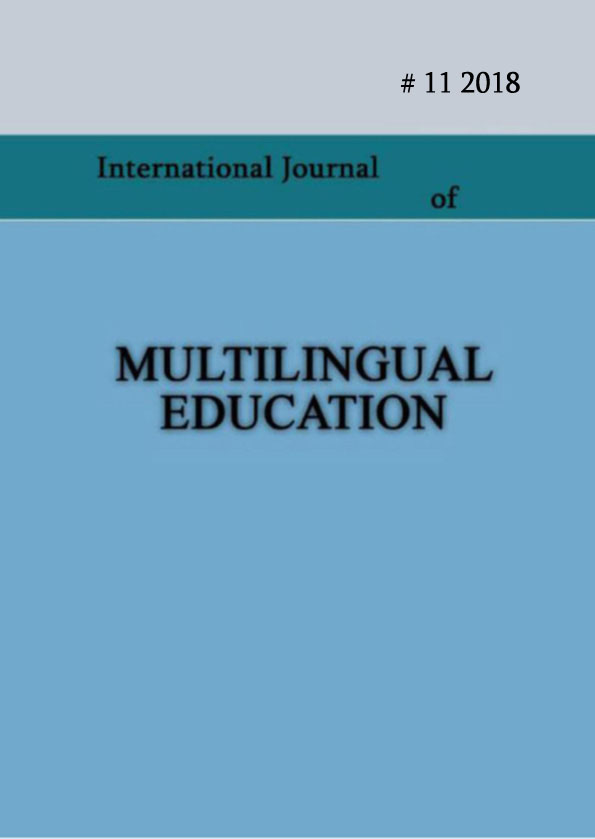The Place of Values in Plurilingual Education: A University Teachers’ Viewpoint
Keywords:
Value attitudes, plurilingual education, university teachers, teaching/ learning process.Abstract
Contemporary university education is based on the development of students’ competences that is generally being understood as the unity of knowledge, skills and value attitudes. While knowledge and skills can be easily measured and evaluated in the teaching / learning process, value attitudes seem to fall in the category of more intangible things, the development of which could not be very easily tested and assessed. Therefore, value attitudes may not always be in the focus of attention of university teachers, although they seem to be responsible for nurturing value attitudes of students. The development of value attitudes in the process of plurilingual education is especially necessary as values can be the core or foundation that helps learners realize the necessity of learning languages, foster their motivation and expand their understanding and acceptance of diversity issues. Thus, the aim of this research was to find out the university teachers’ views on the development of students’ value attitudes in plurilingual education. The aim was specified by several research questions: why values should be integrated in the teaching of their subjects, what values could be developed within the framework of teaching their subjects at universities, and what teaching / learning methods should be applied. The research was qualitative, there were 10 teachers from different universities of Lithuania interviewed and it was carried out in 2017. The results of the current research were compared with the research into university teachers’ viewpoints on the development of value attitudes conducted in 2013, when university teachers from Ukraine, Georgia, and Latvia were interviewed. The conclusion is made that university teachers are aware of the necessity of the development of values in plurilingual education, although they seem to lack the Know-How. University teachers have to create favourable learning environment, choose appropriate teaching / learning materials and apply suitable teaching / learning methods.
References
A framework of reference for pluralistic approaches to languages and cultures. Retrieved from http://carap.ecml.at/Descriptorsofresources/tabid/2654/language/en-GB/Default.aspx
Beacco & Byram (2003). Guide for the Development of Language Education Policies in Europe. Language Policy Division Council of Europe. https://www.coe.int/t/dg4/linguistic/Source/FullGuide_EN.pdf
Byram, Michael. (2000). Assessing intercultural competence. Sprogforum 18 (6): 8-13.
http://inet.dpb.dpu.dk/infodok/sprogforum,Espr_nr18.html. Accessed 27 August 2009.
CARAP / FREPA Project Training Kit. FREPA and educational language policies. (2012). Retrieved from http://carap.ecml.at/LinkClick.aspx?fileticket=FIuVnewvfZ0%3d&tabid=2964&language=en-GB
Clark, J. B., Vanthuyne, A., & Mady, C. (2014). Exploring Reflexivity and Multilingualism in Three French Language Teacher Education Programs. Canadian Journal Of Applied Linguistics, 17(1), 129-155.
Common European Framework of Reference for Languages: learning, teaching, assessment companion volume with new descriptors. Provisional Edition September 2017. Language Policy Programme Education Policy Division Education Department Council of Europe. Retrieved from https://rm.coe.int/common- european-framework-of-reference-for-languages-learning-teaching/168074a4e2
Common European Framework of Reference for Languages: learning, teaching, assessment. Language Policy Unit, Strasbourg www.coe.int/lang-CEFR. Retrieved from https://www.coe.int/t/dg4/linguistic/ source/framework_en.pdf
Fielding, R. (2016). Students' use of their plurilingual resources in Australian schools. Language & Education: An International Journal, 30(4), 361 - 377. doi:10.1080/09500782.2015.1114631
Jeoffrion, C., Marcouyeux, A., Starkey-Perret, R., Narcy-Combes, M., & Birkan, I. (2014). From multilingualism to plurilingualism: university students’ beliefs about language learning in a monolingual context. Language, Culture & Curriculum, 27(1), 8-26.
doi:10.1080/07908318.2014.887724
Kalbų mokymo politikos aprašas: Lietuva. Kalbų politikos skyrius Strasbūre. Lietuvos Respublikos švietimo ir mokslo ministerija, 2004 - 2006. (2006). Vilnius: Švietimo aprūpinimo centras
Published
How to Cite
Issue
Section
License
Copyright (c) 2018 Vilija Targamadzė

This work is licensed under a Creative Commons Attribution-NonCommercial 4.0 International License.
Copyright (c) - Authors who publish with this journal agree to the following terms: Authors retain copyright and grant the journal the right of first publication with the work simultaneously licensed under a Creative Commons Attribution-Noncommercial 4.0 International License, which allows others to share the work with an acknowledgement of the work's authorship and initial publication in this journal. Authors are permitted and encouraged to post their work online (e.g., in institutional repositories or on their personal website) prior to and during the submission process, as it can lead to productive exchanges, as well as earlier and greater citation of published work (see The Effect of Open Access). Authors may enter into separate, additional contractual arrangements for the non-exclusive distribution of the journal's published version of the work (e.g., post it to a repository or publish it in a book), with an acknowledgement of its initial publication in this journal.

